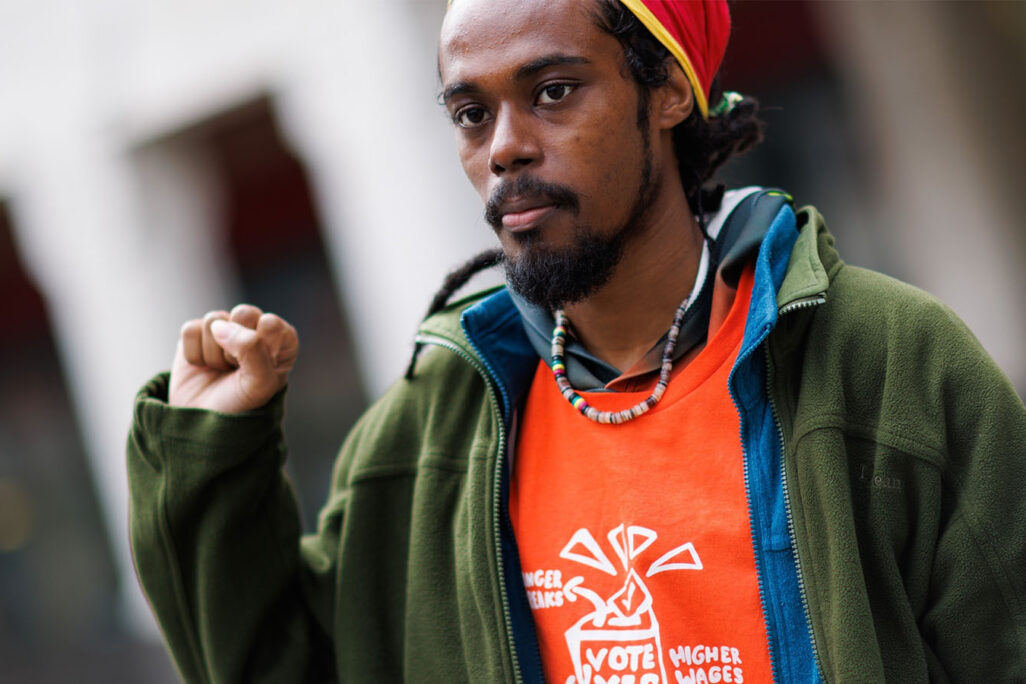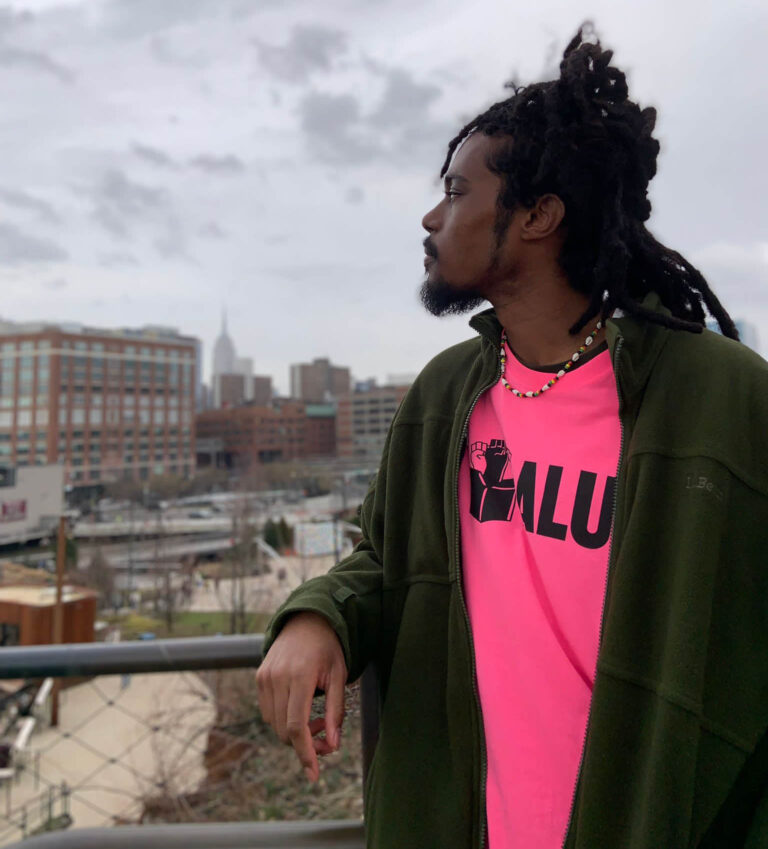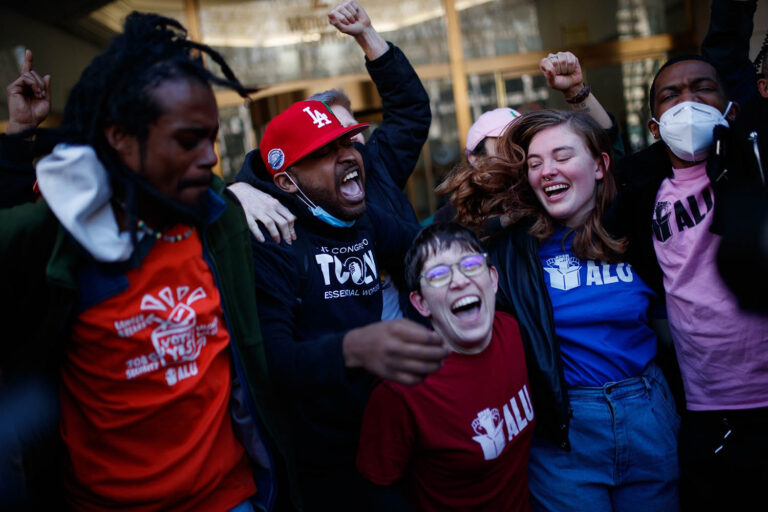
For many years, Amazon, the second largest employer in the United States, has invested millions of dollars in its efforts to thwart various attempts by its employees to form workers’ unions. But this month, a majority of workers at the company’s warehouse in Staten Island, New York voted to become members of the Amazon Labor Union (ALU), representing the first successful unionization drive among Amazon employees. Among the leaders of the historic campaign was Tristan Dutchin, who lives in Brooklyn, New York.
Dutchin, 27, has worked for Amazon two days a week for about a year. His shifts start at 7:15 in the morning and end at 5:45 at night, not counting overtime.
“Amazon is a high-pressure workplace,” said Dutchin in an interview with Davar. “You’re on your feet all day long. There’s no time to sit down except for a few 20 minute breaks. When I go to my workstation in the morning, managers and supervisors check my productivity. It feels like they take everything from you. It’s a chaotic place.”

Once, at the end of an exhausting day of work, Dutchin saw a tent with union organizers giving out snacks. The first person he saw was Derrick Palmer, Vice President of Organizing at the ALU. Palmer described his and other workers’ difficult experiences and encouraged Dutchin to join the union.
“I was at a low point,” said Dutchin. “I didn’t know what a labor union was, and after our conversation I did a little research to understand what it was. I decided to join, and thanks to support from home I’m still there.”
This is the first workers’ union that Dutchin has been a member of.
“Before working at the Amazon warehouse, I delivered packages in different neighborhoods,” Dutchin recalled. “Before that I worked at the airport, and that was terrible. I worked at restaurants and under the table jobs. When I look back on those jobs, I realize I should’ve organized the workers there, but I didn’t know anything about organizing then. It would’ve improved things in my life.”
“You can be the best worker in the warehouse and they’ll still find a way to fire you”
Dutchin saw joining the union as a turning point in his working life.
“To be honest, Amazon is a pretty depressing place,” he said. “You’re there just to earn a salary and go home. But with the union I feel happier and more relaxed. You smile, talk to the people next to you. There’s someone next to you who’ll help you. I have basic support.”
Dutchin described how the organizers worked to strengthen the union and recruit more members.
“After my shift or on my lunch break I would hang out with other union members,” Dutchin said. “We did phone-banking and had conversations with workers to let them know about the upcoming elections and ask them if they had any questions that were bothering them. We passed out brochures explaining what the union is, we passed out food.
“We made connections with workers who had been hostile and even violent, because they believed everything that Amazon had said to them. That was our biggest challenge: to simply explain what the union is about and that we’re trying to do good.”
Not all of the aspects of union organizing came easily to Dutchin. The process involved a lot of interactions that demanded high interpersonal skills, which doesn’t match well with all personality types.
“I’m really good at phone-banking,” said Dutchin, “so when I spoke with workers on the phone it went really well. They gave us a sample conversation script. Sometimes at meetings during breaks at work people would make fun of me or attack me if I didn’t have answers to all of their questions ready on the spot, so I would call another organizer.”
How did the ethnic diversity of the workers affect the organizing process?
“It comes down to the people. All of the workers experience the same mistreatment and disregard from the company. It took me a while to understand that it doesn’t matter what you look like or how highly people think of you. These people will drop you in a second and replace you with someone else. It’s all about money and numbers. You can be the best worker in the warehouse and they’ll still find a way to fire you.”
Were you afraid of being fired?
“I’ve been in the union and working for Amazon for a long time. It’s so weird and surprising to me, because there were so many times I could’ve been fired for no reason, but joining the union was actually what protected me. It’s a good feeling. A lot of workers are in need of workplace protections and employment security. We don’t want anyone’s life to be destroyed or to have everything taken from them just because of their actions behind the scenes.”

What was unique about your organizing efforts that made them successful?
“What makes us unique is that we’re independent. We’re not connected to any outside agenda like Amazon tries to say that we are. We don’t depend on politicians to fight for us. I’m not the secretary or the president of the union, but the fact that I’m a regular organizer and union member made me proud. To feel that I’m giving back to the union, giving to others. Giving out food, giving out literature about organizing, promoting the union on social media when I can.”
Do you have any aspirations in the world of organized labor?
“Yeah, we set the trend. I suddenly got messages from workers from all over the world asking me how to unionize. It was a life-changing moment for me to go from being a regular Amazon worker to a source of inspiration for others. It’s my dream to inspire other people, to give advice, to help out when needed. Every job in society needs a union, every kind of work, we all need better working conditions, better salaries, in order to make the working world better. No one deserves to be a slave to the wage-labor system and to have to fight just to have enough food to eat.
“We have momentum. A lot of people from Britain turn to us asking for help. A lot of people didn’t believe that we were capable, they called us a bunch of stupid dogs. It’s stupid, but at the end of the day we’re still going to keep on fighting for what’s right. Fighting for the workers. We’ve had a lot of workers in the union turn against us and leave. We’ve overcome a lot of obstacles.”
Do you have a message for Israeli workers?
“I’d tell them to unionize. Don’t be afraid to speak out about things that bother you at work. You don’t need to be slaves to the system that you’re in, you can be free. You can unionize and achieve better wages, improved conditions, more support. If you unionize you’ll make that happen.”
Do you see the unionization drive as a personal achievement?
“I see it as an achievement in general and also as a personal achievement. Life is funny. I never thought that I would be a lighthouse for unionizing. I’m a regular person, but all of a sudden I’m like a celebrity.”
What do you see in your future?
“Amazon isn’t where I want to work forever. I’ll work there until I move on. If I’m in another workplace, I won’t be afraid to unionize. Besides that, I’m into music, my dream is to be a full-time musician. I make reggae music. If I get famous from that, people will remember me, that I was part of the union at a rich, giant corporation. I’ve been making music since before I was in the union. People in the union tell me I need to write a song about unionizing at Amazon. I’m from the Caribbean, and that style of music is a big part of my life. Music lifts you up in so many ways.”
This article was translated from Hebrew by Sam Edelman.






